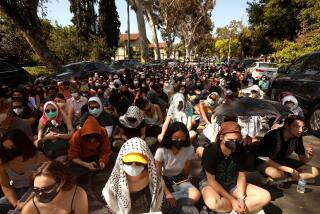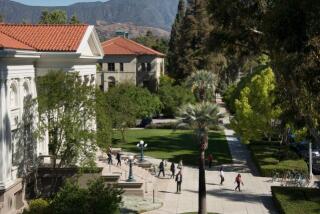PASSINGS: David Alexander, James E. Akins, Sumbat Lapajian, Carl Gordon
David Alexander
Longtime president of Pomona College
David Alexander, 77, who brought national standing to Pomona College during a two-decade tenure as president, died Sunday in Claremont after a long battle with cancer, the college announced.
Alexander was Pomona president from 1969 to 1991. During that time, the college’s endowment grew from $24 million to $296 million and the faculty increased from 130 to 156. He oversaw a campus expansion that added 15 major buildings.
The racial, ethnic and geographic diversity of the student body also grew under his leadership, turning the prestigious liberal arts college — the largest in the private Claremont Colleges system — from a regional institution to one with a national reputation that draws the majority of its students from outside California.
Alexander was born Oct. 18, 1932, in Springfield, Tenn., and grew up in Princeton, Ky. He studied the classics at Southwestern at Memphis College (now Rhodes College), graduating in 1953. In 1954, while enrolled at the Louisville Presbyterian Theological Seminary, he was chosen as a Rhodes Scholar, which enabled him to attend Oxford University in England. In 1957 he earned a doctorate in church history, Greek and Hebrew from Oxford’s Christ Church College.
In 1965, after several years of teaching at San Francisco Theological Seminary, he returned to Southwestern as president, stirring controversy during his tenure by ordering the desegregation of fraternities and sororities. He remained there for four years, until his appointment as Pomona president in 1969 at age 36.
From 1981 to 1998 he served as American secretary of the Rhodes Scholarship Trust, overseeing the selection of 32 Americans each year to study at Oxford. For his service to Oxford, Queen Elizabeth named him a commander of the Order of the British Empire in 1998.
James E. Akins
Ambassador to Saudi Arabia during oil embargo
James E. Akins, 83, U.S. ambassador to Saudi Arabia during the Arab oil embargo in the 1970s, died of a heart attack July 15 at a retirement village in Mitchellville, Md., his daughter Mary Beth Colvill said.
Akins took over as ambassador in September 1973, just a month before the Arab oil embargo began in retaliation for U.S. support of Israel. The embargo ended a year later, but Americans still remember the rationing and, especially, the long lines at gas stations.
Then-Secretary of State Henry A. Kissinger fired Akins in 1975, citing differences. His daughter says Akins went on to consult for multinational corporations, specializing in the Middle East and energy issues.
He was born in 1926 in Akron, Ohio, and attended the University of Akron. After leaving for two years to serve in the Navy in World War II, he graduated in 1947. He entered the Foreign Service in 1954 and spent two decades overseas, including in Syria, Lebanon, Kuwait and Iraq.
He was appointed to the State Department’s top energy post in 1968, where he served until becoming ambassador.
At times, Akins criticized the United States for being so pro-Israel as to alienate Arabs, yet still being dependent upon their oil.
Sumbat Lapajian
Co-founder of Armenian church in U.S.
Archbishop Sumbat Lapajian, 83, a founding member of the Armenian Apostolic Church in America, died July 17 in Mission Hills, the church announced. The cause was not given.
Lapajian was born in Beirut on Jan. 15, 1927, and was soon orphaned. As a teen during World War II, he worked for the British Army in Lebanon. In 1948 he entered the seminary.
Lapajian came to the United States in 1961 as pastor of Holy Cross Armenian Apostolic Church in Los Angeles. In 1973, he was named prelate of the Western Prelacy — or diocese — of the Armenian Apostolic Church of America. He was ordained as a bishop the next year and in 1981 was named archbishop.
Lapajian played a pivotal role in expanding the church in Glendale, Hollywood and Orange County, founding parishes and schools throughout the region, teaching religion and ethics and leading Holy Cross Cathedral in Montebello until health problems forced him to reduce his activities in 1994.
Carl Gordon
Actor played the father on TV’s ‘Roc’
Carl Gordon, 78, who despite a late start on an acting career became a well-known presence on stage and television, died July 20 at his home in Jetersville, Va., of non- Hodgkin’s lymphoma, said his wife, Jacqueline Alston-Gordon.
Gordon was best known for his role in “Roc,”a situation comedy about an African American working-class family in Baltimore that ran on Fox from 1991-94.
Gordon played Andrew Emerson, the father of sanitation worker Roc Emerson, who was played by Charles S. Dutton.
Gordon, Dutton and fellow “Roc” co-star Rocky Carroll were in the Broadway cast of August Wilson’s Pulitzer Prize-winning play “The Piano Lesson” in 1990. Gordon also appeared in “Ain’t Supposed to Die a Natural Death” in 1971 and “Ma Rainey’s Black Bottom” in 2003.
His film roles included “The Brother From Another Planet” in 1984, and his television roles included “The Practice” in 1998, “JAG” in 2002 and “Law & Order” in 2003.
He was born Rufus Carl Gordon Jr. on Jan. 20, 1932, in Goochland, Va. Gordon grew up in Brooklyn, served in the Air Force from 1951 to 1955 and attended Brooklyn College. He was in his 30s and desperate for a fresh start when he turned to acting.
“After two failed marriages, I didn’t like the way my life was headed,” he told the Tennessee Tribune in 2005. “I came home from work one evening, crying and upset.” He said a voice within him said to “try acting.”
Times staff and wire reports
More to Read
Start your day right
Sign up for Essential California for the L.A. Times biggest news, features and recommendations in your inbox six days a week.
You may occasionally receive promotional content from the Los Angeles Times.






